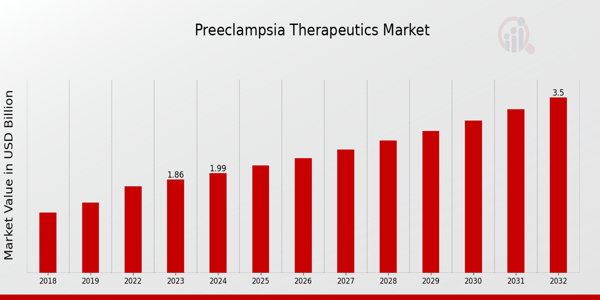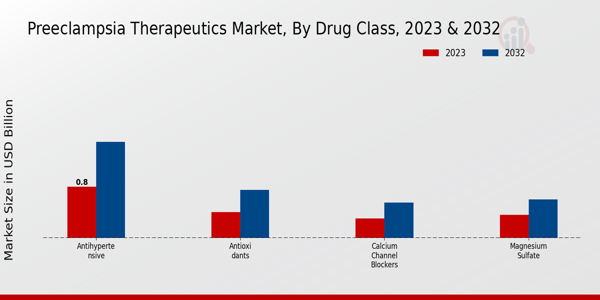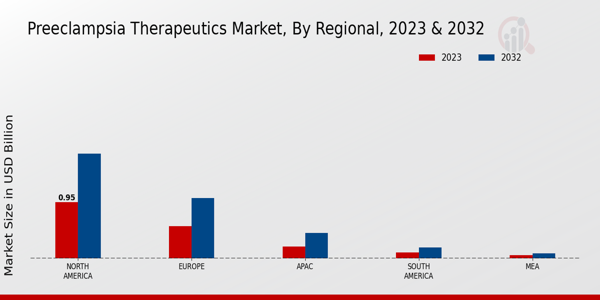Preeclampsia Therapeutics Market Overview
As per MRFR analysis, the Preeclampsia Therapeutics Market Size was estimated at 2.14 (USD Billion) in 2024. The Preeclampsia Therapeutics Market Industry is expected to grow from 2.29 (USD Billion) in 2025 to 4.33 (USD Billion) till 2034, at a CAGR (growth rate) is expected to be around 7.32% during the forecast period (2025 - 2034).
Key Preeclampsia Therapeutics Market Trends Highlighted
Numerous important market drivers have a substantial impact on the preeclampsia therapeutics market.
Preeclampsia is becoming more common, especially in high-risk groups, which highlights how urgently better treatments are needed. The need for novel treatment options is fueled by healthcare providers' growing understanding of the value of early diagnosis and management.
Further propelling market expansion are new drug candidates and treatment approaches found as a result of research and development breakthroughs. Regulatory agencies' assistance in accelerating the approval of innovative treatments is also essential for improving market dynamics.
There are numerous opportunities to be explored within this market. The increasing investment in healthcare infrastructure and research can lead to the development of novel therapeutics targeted specifically at preeclampsia and its complications. Collaboration between biotechnology firms and research institutions holds the potential to accelerate innovation in treatment solutions.
Expanding educational initiatives for women about preeclampsia can stimulate demand for preventive and therapeutic measures. Furthermore, emerging markets present a fertile ground for growth as improved healthcare systems evolve and the need for effective management strategies for preeclampsia becomes recognized.
Recent times have witnessed notable trends, including the exploration of biomarkers for early detection and personalized treatment approaches. There is a growing emphasis on preventative treatment strategies as opposed to reactive ones, focusing on lifestyle modifications and risk assessment.
The integration of digital health technologies is gaining traction, allowing for better monitoring of patients at risk. As research continues to evolve, the trend toward developing combined therapies that address multiple aspects of preeclampsia underscores the market's transformative potential.
Overall, these factors influence a rapidly changing landscape where innovation and patient-focused care are becoming increasingly paramount.

Source: Primary Research, Secondary Research, Market Research Future Database and Analyst Review
Preeclampsia Therapeutics Market Drivers
Rising Incidence of Preeclampsia
The increasing incidence of preeclampsia, a serious pregnancy-related condition, is a significant driver for the growth of the Preeclampsia Therapeutics Market. The rising awareness regarding maternal health and the growing rates of pregnancies, particularly among women of advanced maternal age and those with pre-existing health conditions, have led to a noticeable surge in cases of preeclampsia.
As healthcare systems evolve and encourage more rigorous prenatal care, the diagnosis rate of this condition has also increased, which in turn amplifies the demand for effective therapeutic solutions.
This has sparked interest among pharmaceutical companies and research institutions to invest in the development of novel therapeutic options aimed specifically at managing and treating preeclampsia. Furthermore, educational initiatives aimed at obstetricians and midwives highlight the necessity for effective detection and management strategies, thereby increasing the need for advanced therapeutics.
Given the projected growth of the preeclampsia therapeutics market, companies are focusing on research and development to innovate targeted medications that can mitigate the adverse effects of this condition.
The focus on maternal health and the significant long-term consequences of untreated preeclampsia, including maternal and fetal morbidity and mortality, add urgency to the need for effective treatment options, thereby driving market growth.
An increase in healthcare spending also plays a role, as it supports the movement toward better prenatal care and the development of therapies designed to lower the incidence and severity of preeclampsia, indicating a bright future ahead for the Preeclampsia Therapeutics Market.
Advancements in Treatment Options
Ongoing advancements in treatment options are propelling the Preeclampsia Therapeutics Market. Innovations in drug development and emerging therapies are enabling healthcare providers to offer more effective and safer treatments for women diagnosed with preeclampsia.
These advancements not only enhance patient care but also contribute to increased clinical efficacy, leading to better patient outcomes. The emphasis on precision medicine and targeted therapies further aligns with this trend, creating opportunities to develop customized treatment plans for individual patients.
As pharmaceutical companies invest heavily in research and development to introduce next-generation therapeutics, the depth of available treatment options continues to expand, fostering market growth.
Growing Focus on Maternal Healthcare
The growing focus on maternal healthcare is another vital driver shaping the Preeclampsia Therapeutics Market. Increasing recognition of the importance of maternal health has led to enhanced healthcare policies and initiatives aimed at improving care for pregnant women.
Governments and health organizations worldwide are prioritizing maternal health, resulting in increased funding and resources directed toward the investigation and treatment of preeclampsia and related conditions.
This trend is further fueled by health campaigns that advocate for safer pregnancies, postnatal care, and improved prenatal screening methods, ultimately contributing to the demand for effective therapeutics.
As awareness and education surrounding maternal health issues grow, along with community support programs, the push for better therapeutic options is expected to accelerate the growth of this market.
Preeclampsia Therapeutics Market Segment Insights
Preeclampsia Therapeutics Market Drug Class Insights
The Preeclampsia Therapeutics Market, particularly within the Drug Class segmentation, is poised to experience significant growth. This sector is primarily driven by the crucial need for effective treatment options in managing preeclampsia, a serious condition affecting pregnant women.
The landscape includes key categories such as Antihypertensive, Antioxidants, Calcium Channel Blockers, and Magnesium Sulfate.
The Antihypertensive segment held a majority share in the market, valued at 0.8 USD Billion in 2023, and is expected to grow to 1.5 USD Billion by 2032.
This segment's dominance can be attributed to the critical role of blood pressure management in preeclampsia, making it a vital area for therapeutic intervention.
Following closely was the Antioxidants category, valued at 0.4 USD Billion in 2023, which is projected to increase to 0.75 USD Billion by 2032. The importance of antioxidants lies in their ability to mitigate oxidative stress, a contributor to the severity of preeclampsia, thus offering significant therapeutic potential.
The Calcium Channel Blockers segment, with a valuation of 0.3 USD Billion, is expected to grow to 0.55 USD Billion by 2032.
This category was notable as these medications are often utilized to manage hypertension in pregnant women, reinforcing their significance.
Finally, the Magnesium Sulfate segment, valued at 0.36 USD Billion in 2023 and expected to rise to 0.6 USD Billion by 2032, played a critical role in preventing seizures in women diagnosed with severe preeclampsia.
The overall market is expected to reflect strong growth trends, supported by increasing awareness of the severity of preeclampsia and the evolving landscape of treatment options. This includes an emphasis on innovative pharmaceuticals and the potential for new therapeutic approaches driven by ongoing research and development in the field.
The Preeclampsia Therapeutics Market revealed a dynamic interplay between different drug classes, reflecting their unique roles in addressing the complex clinical challenges posed by preeclampsia, which underlines the urgency and importance of expanding research and treatment strategies in this sector.
As healthcare continues to evolve, understanding the nuances within the Drug Class segmentation will be crucial for stakeholders involved in improving maternal health outcomes.
Source: Primary Research, Secondary Research, Market Research Future Database and Analyst Review
Preeclampsia Therapeutics Market Route of Administration Insights
The Route of Administration segment within the Preeclampsia Therapeutics Market has seen notable developments. This segment encompasses various methods such as Oral, Intravenous, and Subcutaneous administration, each playing a crucial role in the delivery of therapeutics.
Oral administration is favored for its convenience and ease of use, making it popular among patients for long-term treatment. Intravenous administration dominates in hospital settings, providing rapid medication delivery, which is essential in critical cases.
Subcutaneous methods often offer a balance, enabling self-administration and ensuring consistent absorption of medication. These diverse administration routes are critical in addressing different patient needs, facilitating adherence to treatment, and managing preeclampsia more effectively.
The overall Preeclampsia Therapeutics Market revenue is bolstered by advancements in drug formulations and an increasing focus on patient-centered therapeutic options. With a growing understanding of the importance of personalized medicine and accessibility, the segment is expected to witness substantial growth, supported by ongoing research and development efforts.
Enhanced Preeclampsia Therapeutics Market data indicates positive trends driven by the rising prevalence of preeclampsia, presenting lucrative opportunities for stakeholders and prompting ongoing innovation within the industry.
Preeclampsia Therapeutics Market Therapeutic Area Insights
The market segmentation reveals critical areas such as Maternal Health, Fetal Health, and Prevention, which are instrumental in shaping the overall landscape of therapeutic responses to preeclampsia.
Maternal Health focuses on treatments that directly target the well-being of mothers, which is essential considering the serious implications of preeclampsia on maternal morbidity. Fetal Health emphasizes interventions aimed at protecting the unborn child's safety and development, highlighting the majority holding of this area in therapeutics.
Prevention strategies are gaining momentum as healthcare professionals increasingly recognize the importance of early identification and intervention in managing preeclampsia risk factors. The Preeclampsia Therapeutics Market data indicates that an integrated approach across these areas will greatly enhance patient outcomes.
Trends in the industry suggest a stronger emphasis on preventive measures and maternal-fetal health partnerships, aiming to mitigate risks associated with preeclampsia effectively.
Challenges such as access to care and variations in treatment protocols remain, yet they present opportunities for innovation and improved healthcare delivery.
Overall, this segment plays a crucial role in improving health outcomes for both mothers and their infants, further driving the market growth.
Preeclampsia Therapeutics Market End Users Insights
The Preeclampsia Therapeutics Market is set to witness significant growth, particularly in the End Users segment, which includes Hospitals, Clinics, and Home Care settings.
Hospitals play a crucial role in this segment, providing critical care and advanced treatment options that are essential in managing the condition effectively. Clinics, on the other hand, serve as vital touchpoints for early diagnosis and monitoring, thus helping in timely interventions.
Home Care is gaining traction as patients increasingly prefer more personalized, at-home treatment options, showcasing a shifting trend towards convenience and comfort for managing healthcare.
The Preeclampsia Therapeutics Market statistics reveal that these segments are vital for addressing the management and care requirements for preeclampsia while also driving the overall market growth by enhancing patient accessibility to innovative therapeutics.
Such dynamics indicate a strong market demand, supported by various factors such as an increasing number of pregnancies and a rise in awareness about the adverse effects of preeclampsia, presenting considerable opportunities for stakeholders in the industry.
Preeclampsia Therapeutics Market Regional Insights
In North America, the market held the majority share, valued at 0.95 USD Billion in 2023 and anticipated to rise to 1.77 USD Billion by 2032, reflecting its dominant position due to advanced healthcare infrastructure and high prevalence of the condition. Europe also showed a notable presence, with a valuation of 0.55 USD Billion in 2023, expected to grow to 1.02 USD Billion by 2032, driven by growing awareness and research in maternal health.
The APAC region, while smaller, represented a developing market valued at 0.2 USD Billion in 2023 and projected at 0.43 USD Billion by 2032, with increasing healthcare access and emphasis on maternal care being key growth drivers.
South America and MEA regions possessed smaller market shares, valued at 0.1 USD Billion and 0.06 USD Billion, respectively, in 2023, with growth in these areas largely influenced by local healthcare advancements and initiatives aimed at improving maternal health outcomes.
Overall, the Preeclampsia Therapeutics Market witnessed trends of increasing investment and innovation across these regions, highlighting both challenges and opportunities as healthcare providers strive to manage this serious condition effectively.
Source: Primary Research, Secondary Research, Market Research Future Database and Analyst Review
Preeclampsia Therapeutics Market Key Players and Competitive Insights
The Preeclampsia Therapeutics Market presents a dynamic and competitive landscape characterized by various pharmaceutical companies striving to innovate and capture market share. Preeclampsia is a significant complication during pregnancy that necessitates effective therapeutic solutions to ensure maternal and fetal health.
The competitive insights within this market highlight ongoing research and development initiatives, strategic partnerships, collaborations, and mergers and acquisitions as companies seek to diversify their product offerings and enhance their capabilities.
As the awareness surrounding preeclampsia and its implications grows, so does the focus on developing tailored therapeutics that address the needs of patients effectively. The market is not only segmented by drug types but also further analyzed by geography, allowing players to strategically position themselves in emerging and established markets.
Sanofi stands as a notable contender within the Preeclampsia Therapeutics Market, showcasing strengths that contribute to its competitive edge. The company is recognized for its strong research and development infrastructure, enabling it to stay at the forefront of innovative therapeutic solutions aimed at addressing preeclampsia.
Sanofi's commitment to understanding the complexities of maternal health puts it in a favorable position for attracting partnerships with healthcare providers and research institutions. Additionally, the company's robust presence facilitates efficient distribution channels, enabling it to meet the demands of various regions effectively.
Sanofi's established reputation and experience in the pharmaceutical domain allow it to navigate regulatory challenges proficiently and align its product offerings with market trends and patient needs, thereby reinforcing its standing within the preeclampsia therapeutics segment.
Merck also plays a vital role in the Preeclampsia Therapeutics Market, leveraging its strengths to compete in this specialized sector. The company is well-equipped with a diversified portfolio of products and a strong emphasis on innovation in research and development.
Merck's strategic focus on women's health is particularly advantageous, as it aligns with the growing need for effective management of conditions like preeclampsia. Merck's investment in clinical trials and its drive for scientific collaborations facilitate advancements in therapeutic options available for this condition.
Moreover, the company benefits from an extensive distribution network, allowing it to ensure product accessibility across various geographic regions. This capacity not only enhances Merck's visibility in the market but also positions it as a reliable partner for healthcare professionals seeking effective preeclampsia therapeutics.
Key Companies in the Preeclampsia Therapeutics Market Include
Preeclampsia Therapeutics Market Developments
Recent developments in the Preeclampsia Therapeutics Market have showcased significant advancements and growing attention from major pharmaceutical companies. Companies such as Sanofi, Merck, and Johnson and Johnson are actively researching new treatment options, emphasizing the need for effective management of preeclampsia, which affects a notable percentage of pregnancies worldwide.
Eli Lilly and AstraZeneca have made strides in clinical trials, showcasing promising therapeutic candidates that may alter the landscape of treatment for hypertensive disorders during pregnancy.
Mergers and acquisitions have also been a topic of interest, with firms like Bristol Myers Squibb and Novartis exploring strategic collaborations to enhance their portfolios in women's health. Meanwhile, Amgen and AbbVie continue to focus on leveraging cutting-edge technologies to innovate solutions for preeclampsia management.
The market is witnessing an increase in valuation, largely influenced by rising investments in research and development, which stimulate competition and drive improvements in patient outcomes.
Growth in this segment indicates a heightened awareness and urgency to address this critical condition, reflecting a broader commitment to maternal health within the pharmaceutical industry.
Preeclampsia Therapeutics Market Segmentation Insights
Preeclampsia Therapeutics Market Drug Class Outlook
Preeclampsia Therapeutics Market Route of Administration Outlook
Preeclampsia Therapeutics Market Therapeutic Area Outlook
Preeclampsia Therapeutics Market End Users Outlook
Preeclampsia Therapeutics Market Regional Outlook
| Report Attribute/Metric |
Details |
|
Market Size 2024
|
2.14 (USD Billion)
|
|
Market Size 2025
|
2.29 (USD Billion)
|
|
Market Size 2034
|
4.33 (USD Billion)
|
|
Compound Annual Growth Rate (CAGR)
|
7.32 % (2025 - 2034)
|
|
Report Coverage
|
Revenue Forecast, Competitive Landscape, Growth Factors, and Trends
|
|
Base Year
|
2024
|
|
Market Forecast Period
|
2025 - 2034
|
|
Historical Data
|
2020 - 2024
|
| Market Forecast Units |
USD Billion |
| Key Companies Profiled |
Sanofi, Merck, Johnson and Johnson, Eli Lilly, Mallinckrodt, Bristol Myers Squibb, Novartis, AstraZeneca, Amgen, AbbVie, Teva, Horizon Therapeutics, UCB, Pfizer, GSK |
| Segments Covered |
Drug Class, Route of Administration, Therapeutic Area, End Users, Regional |
| Key Market Opportunities |
Increasing prevalence of preeclampsia, Advancements in precision medicine, Growth in personalized therapeutics, Rising demand for early diagnosis, Expansion of telemedicine in healthcare |
| Key Market Dynamics |
Rising prevalence of hypertension, Increased awareness and diagnosis, Advancements in therapeutics, Growing investment in research, Government support and funding |
| Countries Covered |
North America, Europe, APAC, South America, MEA |
Frequently Asked Questions (FAQ):
The Preeclampsia Therapeutics Market is projected to reach 3.5 USD Billion by 2034.
The expected CAGR for the Preeclampsia Therapeutics Market from 2025 to 2034 is 7.3%.
North America held the largest market share in the Preeclampsia Therapeutics Market, valued at 0.95 USD Billion in 2023.
The Antihypertensive segment in the Preeclampsia Therapeutics Market was valued at 0.8 USD Billion in 2023.
Major players in the Preeclampsia Therapeutics Market include Sanofi, Merck, Johnson Johnson, and Eli Lilly.
The market for Magnesium Sulfate in the Preeclampsia Therapeutics Market is expected to grow to 0.6 USD Billion by 2034.
The market value for Europe in the Preeclampsia Therapeutics Market was 0.55 USD Billion in 2023.
The Antioxidants segment in the Preeclampsia Therapeutics Market is expected to reach 0.75 USD Billion by 2034.
Challenges such as regulatory hurdles and the complexity of drug development could impact the growth of the Preeclampsia Therapeutics Market.
The Asia-Pacific region is expected to experience significant growth, reaching 0.43 USD Billion by 2034.

















